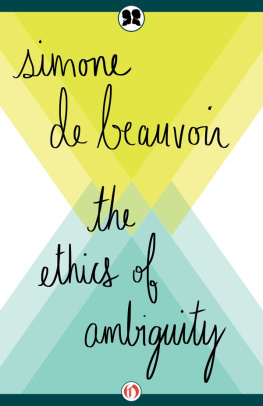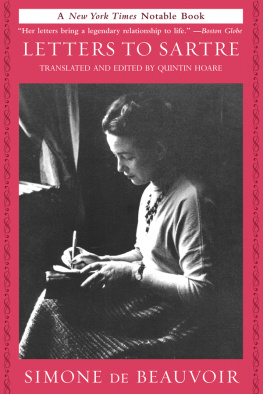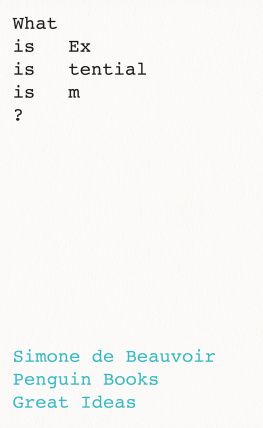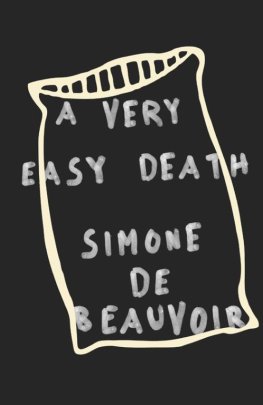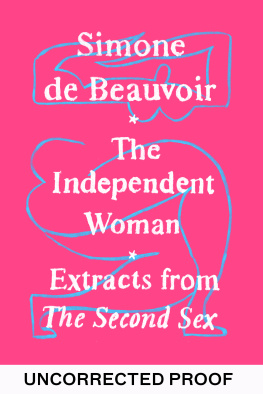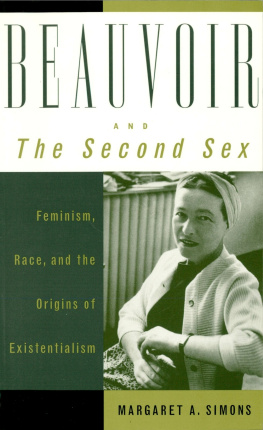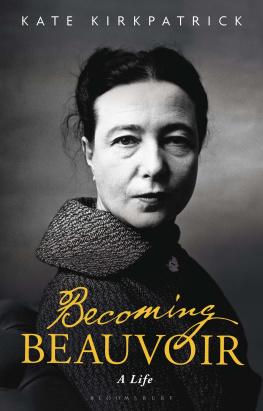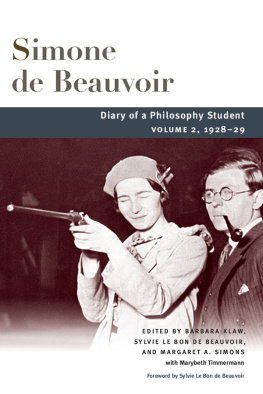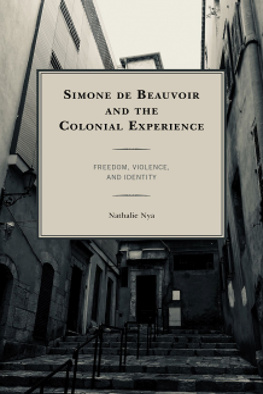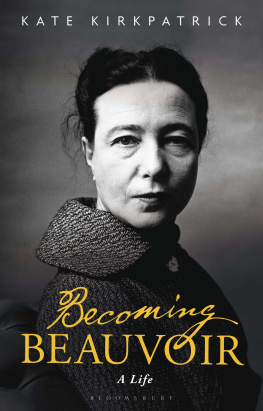Simone de Beauvoir - The Ethics of Ambiguity
Here you can read online Simone de Beauvoir - The Ethics of Ambiguity full text of the book (entire story) in english for free. Download pdf and epub, get meaning, cover and reviews about this ebook. year: 0, genre: Science. Description of the work, (preface) as well as reviews are available. Best literature library LitArk.com created for fans of good reading and offers a wide selection of genres:
Romance novel
Science fiction
Adventure
Detective
Science
History
Home and family
Prose
Art
Politics
Computer
Non-fiction
Religion
Business
Children
Humor
Choose a favorite category and find really read worthwhile books. Enjoy immersion in the world of imagination, feel the emotions of the characters or learn something new for yourself, make an fascinating discovery.
- Book:The Ethics of Ambiguity
- Author:
- Genre:
- Year:0
- Rating:4 / 5
- Favourites:Add to favourites
- Your mark:
- 80
- 1
- 2
- 3
- 4
- 5
The Ethics of Ambiguity: summary, description and annotation
We offer to read an annotation, description, summary or preface (depends on what the author of the book "The Ethics of Ambiguity" wrote himself). If you haven't found the necessary information about the book — write in the comments, we will try to find it.
The Ethics of Ambiguity — read online for free the complete book (whole text) full work
Below is the text of the book, divided by pages. System saving the place of the last page read, allows you to conveniently read the book "The Ethics of Ambiguity" online for free, without having to search again every time where you left off. Put a bookmark, and you can go to the page where you finished reading at any time.
Font size:
Interval:
Bookmark:
TABLE OF CONTENTS
Life in itself is neither good nor
evil, it is the place of good and evil,
according to what you make it.
Montaigne.
I
T HE continous work of our life, says Montaigne, is to build death. He quotes the Latin poets: Prima, quae vitam dedit, hora corpsit. And again: Nascentes morimur. Man knows and thinks this tragic ambivalence which the animal and the plant merely undergo. A new paradox is thereby introduced into his destiny. Rational animal, thinking reed, he escapes from his natural condition without, however, freeing himself from it. He is still a part of this world of which he is a consciousness. He asserts himself as a pure internality against which no external power can take hold, and he also experiences himself as a thing crushed by the dark weight of other things. At every moment he can grasp the non-temporal truth of his existence. But between the past which no longer is and the future which is not yet, this moment when he exists is nothing. This privilege, which he alone possesses, of being a sovereign and unique subject amidst a universe of objects, is what he shares with all his fellow-men. In turn an object for others, he is nothing more than an individual in the collectivity on which he depends.
As long as there have been men and they have lived, they have all felt this tragic ambiguity of their condition, but as long as there have been philosophers and they have thought, most of them have tried to mask it. They have striven to reduce mind to matter, or to reabsorb matter into mind, or to merge them within a single substance. Those who have accepted the dualism have established a hierarchy between body and soul which permits of considering as negligible the part of the self which cannot be saved. They have denied death, either by integrating it with life or by promising to man immortality. Or, again they have denied life, considering it as a veil of illusion beneath which is hidden the truth of Nirvana.
And the ethics which they have proposed to their disciples has always pursued the same goal. It has been a matter of eliminating the ambiguity by making oneself pure inwardness or pure externality, by escaping from the sensible world or by being engulfed in it, by yielding to eternity or enclosing oneself in the pure moment. Hegel, with more ingenuity, tried to reject none of the aspects of mans condition and to reconcile them all. According to his system, the moment is preserved in the development of time; Nature asserts itself in the face of Spirit which denies it while assuming it; the individual is again found in the collectivity within which he is lost; and each mans death is fulfilled by being canceled out into the Life of Mankind. One can thus repose in a marvelous optimism where even the bloody wars simply express the fertile restlessness of the Spirit.
At the present time there still exist many doctrines which choose to leave in the shadow certain troubling aspects of a too complex situation. But their attempt to lie to us is in vain. Cowardice doesnt pay. Those reasonable metaphysics, those consoling ethics with which they would like to entice us only accentuate the disorder from which we suffer. Men of today seem to feel more acutely than ever the paradox of their condition. They know themselves to be the supreme end to which all action should be subordinated, but the exigencies of action force them to treat one another as instruments or obstacles, as means. The more widespread their mastery of the world, the more they find themselves crushed by uncontrollable forces. Though they are masters of the atomic bomb, yet it is created only to destroy them. Each one has the incomparable taste in his mouth of his own life, and yet each feels himself more insignificant than an insect within the immense collectivity whose limits are one with the earths. Perhaps in no other age have they manifested their grandeur more brilliantly, and in no other age has this grandeur been so horribly flouted. In spite of so many stubborn lies, at every moment, at every opportunity, the truth comes to light, the truth of life and death, of my solitude and my bond with the world, of my freedom and my servitude, of the insignificance and the sovereign importance of each man and all men. There was Stalingrad and there was Buchenwald, and neither of the two wipes out the other. Since we do not succeed in fleeing it, let us therefore try to look the truth in the face. Let us try to assume our fundamental ambiguity. It is in the knowledge of the genuine conditions of our life that we must draw our strength to live and our reason for acting.
From the very beginning, existentialism defined itself as a philosophy of ambiguity. It was by affirming the irreducible character of ambiguity that Kierkegaard opposed himself to Hegel, and it is by ambiguity that, in our own generation, Sartre, in Being and Nothingness, fundamentally defined man, that being whose being is not to be, that subjectivity which realizes itself only as a presence in the world, that engaged freedom, that surging of the for-oneself which is immediately given for others. But it is also claimed that existentialism is a philosophy of the absurd and of despair. It encloses man in a sterile anguish, in an empty subjectivity. It is incapable of furnishing him with any principle for making choices. Let him do as he pleases. In any case, the game is lost. Does not Sartre declare, in effect, that man is a useless passion, that he tries in vain to realize the synthesis of the for-oneself and the in-oneself, to make himself God? It is true. But it is also true that the most optimistic ethics have all begun by emphasizing the element of failure involved in the condition of man; without failure, no ethics; for a being who, from the very start, would be an exact co-incidence with himself, in a perfect plenitude, the notion of having-to-be would have no meaning. One does not offer an ethics to a God. It is impossible to propose any to man if one defines him as nature, as something given. The so-called psychological or empirical ethics manage to establish themselves only by introducing surreptitiously some flaw within the manthing which they have first defined. Hegel tells us in the last part of The Phenomenology of Mind that moral consciousness can exist only to the extent that there is disagreement between nature and morality. It would disappear if the ethical law became the natural law. To such an extent that by a paradoxical displacement, if moral action is the absolute goal, the absolute goal is also that moral action may not be present. This means that there can be a having-to-be only for a being who, according to the existentialist definition, questions himself in his being, a being who is at a distance from himself and who has to be his being.
Well and good. But it is still necessary for the failure to be surmounted, and existentialist ontology does not allow this hope. Mans passion is useless; he has no means for becoming the being that he is not. That too is true. And it is also true that in Being and Nothingness Sartre has insisted above all on the abortive aspect of the human adventure. It is only in the last pages that he opens up the perspective for an ethics. However, if we reflect upon his descriptions of existence, we perceive that they are far from condemning man without recourse.
The failure described in Being and Nothingness is definitive, but it is also ambiguous. Man, Sartre tells us, is a being who makes himself a lack of being in order that there might be being. That means, first of all, that his passion is not inflicted upon him from without. He chooses it. It is his very being and, as such, does not imply the idea of unhappiness. If this choice is considered as useless, it is because there exists no absolute value before the passion of man, outside of it, in relation to which one might distinguish the useless from the useful. The word useful has not yet received a meaning on the level of description where
Next pageFont size:
Interval:
Bookmark:
Similar books «The Ethics of Ambiguity»
Look at similar books to The Ethics of Ambiguity. We have selected literature similar in name and meaning in the hope of providing readers with more options to find new, interesting, not yet read works.
Discussion, reviews of the book The Ethics of Ambiguity and just readers' own opinions. Leave your comments, write what you think about the work, its meaning or the main characters. Specify what exactly you liked and what you didn't like, and why you think so.

